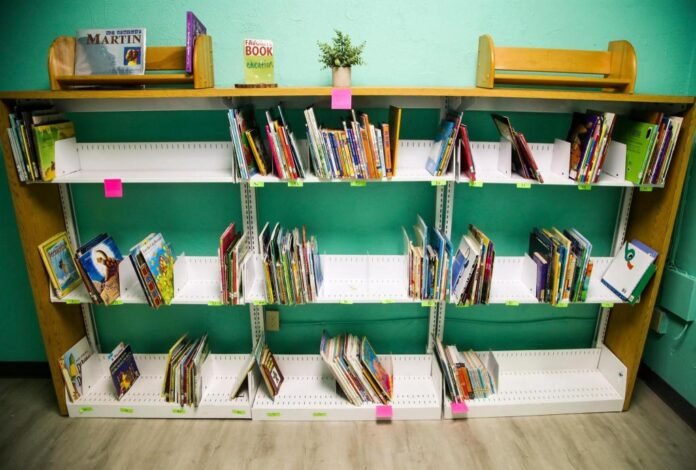Battling on a new front in Florida’s ongoing school book disputes, Orange and Osceola school districts have each pulled more than a dozen books that the state’s education board called “pornographic” on a list sent to another school district last month.
The latest removals follow the mounting state pressure on Hillsborough County Public Schools, where its superintendent faced a barrage of questions from the state’s education board last week about materials in schools that Florida Attorney General James Uthmeier had decried.
Hillsborough in recent weeks received two letters, one from Uthmeier and the other from Education Commissioner Manny Diaz Jr, ordering the removal of “inappropriate” books from its schools.
The state included a list of more than 50 books it deemed pornographic, which appeared to have been copied from an advocacy group called Citizens Defending Freedom. Other district superintendents then asked for those lists in order to check with their own libraries.
In the minds of school officials in Hillsborough, Orange and elsewhere, the letters went beyond the book review process articulated in state law, which creates a citizen complaint process and local school board review of challenged books. Many more books have been removed through that process, but state officials have not previously singled out books for districts to remove.
Nevertheless, Orange in a school board meeting last week chose to remove 13 of the books that appeared on the new list, including six that had previously been reviewed by the district and retained. Those books include “Forever” by Judy Blume, “Last Night at the Telegraph Club” by Malinda Lo, “Forever for a Year” by B. T. Gottfred, “And They Lived…” by Steven Salvatore, “Homegoing” by Yaa Gyasi and “Red Hood” by Elana K. Arnold.
Other books on the state list either already had been removed or were not in OCPS schools.
Osceola removed 14 books from its shelves, according to a district spokesperson, and other districts across the state are expected to follow suit in the coming weeks.
Orange County’s school board, which met last week to discuss the removals, decided to pull the books out of an abundance of caution, it said. Keeping any of the books on district shelves could open the district up to further state scrutiny, district legal counsel John Palmerini told the board last week.
“While I disagree with their determination that these books are pornographic as the law defines it … I think it would be perilous for this board to allow these books to remain on the shelves,” Palmerini said.
Orange superintendent Maria Vazquez said that while the district had not received letters from the state about its classroom libraries, as Hillsborough had, she interprets the state’s pressure on Hillsborough County as meaning they “have to be removed” from OCPS schools.
Board members reluctantly agreed to remove the books, with several saying that the state was overstepping the district’s statutory authority to judge challenged books.
Board Member Angie Gallo said the state’s list was “sidelining due process” and infringed on the First Amendment.
“Today it’s books. Tomorrow, it could be something else,” she said.
But members also said there’d been too much district time and money spent on reviewing books when most students don’t even check books out from school libraries.
Board Member Melissa Byrd called it a “non-issue that was made an issue” because of politics. She said phones pose more of a threat to kids given what they can access from the internet.
“If they want more books pulled off our shelves, they can continue to tell us that, because I don’t think that we need to be spending another dime, another minute of staff time on this issue. We have got bigger things to worry about, and I’m tired of it. I’m tired of talking about it,” Byrd said.
Such self-censorship seems to be the goal, said Stephana Ferrell, co-director of the Florida Freedom to Read Project. She understands why the board removed the books, but she wishes members had stuck by their community, which she said is against removing the books.
“This isn’t just about books at this point. This is about local control and our ability to have the public education system that the parents of Orange County would like for their students,” Ferrell said.
She said districts across the state will likely follow Orange’s lead on preemptively removing books, with several other district school boards convening this week.
Orange already has removed hundreds of books from shelves in it libraries and classrooms in the past few years as a result of state legislation governing content in Florida schools. In the 2023-24 school year, Orange removed about 675 books for fear they violated the law prohibiting content involving “sexual conduct.”
Originally Published:






